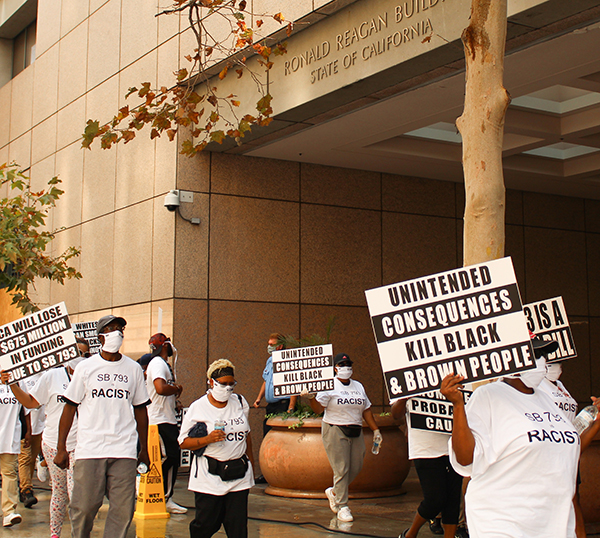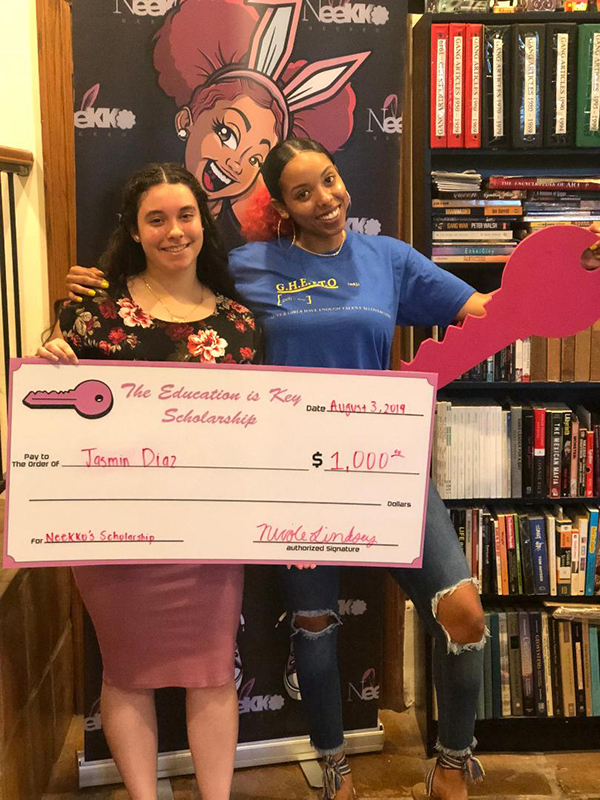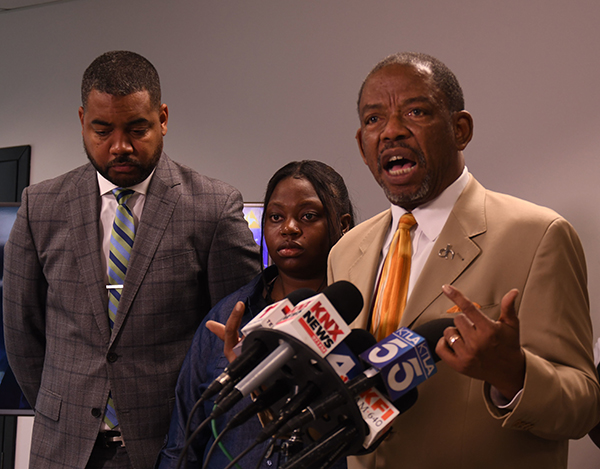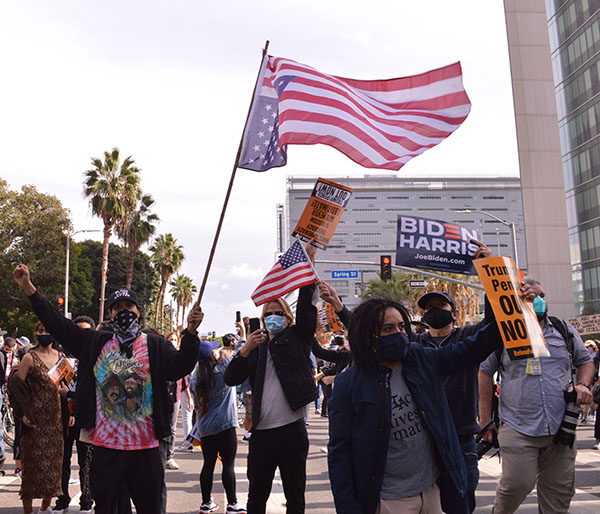Music and mentoring lead underserved L.A. students to college: Making a Difference

LOS ANGELES — In a world where opportunity often seems out of reach, the Harmony Project has been a beacon of hope for nearly 4,000 students from economically disadvantaged households and underserved communities.
Led by Executive Director Natalie Jackson, Harmony Project is L.A.’s largest community-based, music-focused, nonprofit education organization. It has built a music education and college-prep program that takes a holistic approach to student success, providing a full range of social, emotional and educational support. The organization supports students from kindergarten through high school graduation and into college.
Harmony Project envisions a world in which all students, regardless of income, background or zip code, have equal access to opportunities to make music and the resources needed to thrive in college and beyond.
The organization provides a wide range of group and private course instructions including concert choir, jazz choir, trombone, percussion, oboe, trumpet, music production, songwriting, tuba, French horn, violin, viola, guitar, vocal performance ensembles, clarinet, cello, bassoon, bass, a capella/vocal jazz ensembles, and African drums.
“Our goal is to leverage music and our holistic approach to child development so that children can attain higher education, all to increase the economic mobility of their family,” said Harmony Project Communications Director Devon Sherwood. “About 83% of our graduates will be first-generation college students in the fall.”
Harmony Project’s approach to student success has resulted in impressive outcomes, with 98% of the graduating high school class accepted to a college or university during the 2024-2025 academic year.
The organization was founded in 2001 by Bob Forst, Margaret Martin, Susan Plutsky, Tony Silbert, Tim Smoot and Howard Banchik.
“I wanted to be a part of Harmony Project because I’ve always been a lover of music,” said Banchik, who helped build the organization. “I have a teaching credential in music. Plus, I’ve always had a soft spot for underserved children.
“We’ve served over 40,000 people since our establishment. We’re working with 4,000 right now,” he added.
While music is an integral part of Harmony Project, Banchik, 86, is quick to point out the organization’s goal.
“Although it’s a wonderful music program, we’re not a conservatory,” he said. “The goal of the Harmony Project is to help children develop character. It’s about learning the importance of responsibility, cooperation and discipline. Our goal is for participants to graduate from high school and attend college.”
Banchik said Harmony Project is a “full scholarship program.”
“The participants get instruments and lessons,” said Banchik, a former saxophonist. “Participating in our program has nothing to do with musical talent. It’s about attendance and being reliable. The number of participants is based on the amount of money we can raise. Some of the kids come on referrals. We take as many as we can. All of this is free for the kids.”
“The students can take advantage of our college readiness program,” Sherwood said. “We help them with college essays, financial aid and social services. We provide the resources for free. … Every Harmony Project graduating student gets a $5,000 scholarship if they are accepted into a college or vocational school. We are building the next leaders.”
Sherwood said Harmony Project has a relationship with several school districts, including the Los Angeles Unified School District, and schools in Leimert Park, Compton, Exposition Park, the Hollywood Youth Orchestra, Pasadena, Glendale, Hawthorne, Lawndale, Paramount, San Fernando Valley, La Habra and the Lennox Regional Youth Orchestra.
The organization works with public and charter schools, government initiatives, community partners, professional musicians and supportive neighbors.
Harmony Project’s impact on the lives of young people is a testament to the transformative power of music education and holistic support.
The Harmony Project’s comprehensive approach goes beyond traditional music education. By providing free music lessons, social services and college readiness support, the organization addresses the unique needs of its students, many of whom face significant barriers to success.
“We are trying to bridge gaps,” Sherwood said. “We want to do away with financial barriers. We want to help our kids achieve a higher education. There are benefits from music instruction. Our curriculum is research-based. We are about building self-confidence.”
Some of that self-confidence was on display when some of Harmony Project’s orchestras performed at Disney Hall, the Hollywood Bowl, and at Dodger Stadium as part of the Black Heritage Night festivities honoring Juneteenth last month.
Sherwood said, from instrument instruction to mentorship and academic guidance, Harmony Project’s programs are designed to foster not only musical talent but also confidence, resilience and a sense of purpose.
For students served by the Harmony Project, access to quality education and resources can be limited. By offering a free and supportive environment, the organization helps level the playing field, empowering young people to pursue their dreams and achieve their full potential.
“The public should care about Harmony Project because it improves society,” Banchik said. “We operate almost with no government funding. Individuals and family foundations fund us. We are always in need of donations because there is a long waiting list of children. You’re helping them maximize their potential.”
“We’re going beyond the notes,” Sherwood added. “We are providing a safe and supportive environment. We’re providing a space of ownership.”
As students progress through the program, they develop essential life skills, including discipline, teamwork and self-expression.
The Harmony Project’s ultimate goal is to increase the economic mobility of its students’ families by helping them attain higher education.
By providing college readiness support and guidance, the organization ensures that its students are well-prepared to pursue their academic aspirations.
Many Harmony Project alumni have gone on to attend top colleges and universities, breaking cycles of poverty and creating brighter futures for themselves and their families.
As the Harmony Project prepares to celebrate its 25th anniversary, it reflects on a legacy of impact and a commitment to empowering young lives through music.
“The 25th anniversary is an opportunity for the organization to pay homage to all of the various stakeholders who made Harmony Project a leader of music education that it is today,” said Sherwood, who studied sociology at Duke University and received a master’s degree in sports management, ethics and music education. “Everyone has played a key role in making an impact within the greater Los Angeles community, from our founder to our board members, to our students, staff, teaching artists, and families.”
Sherwood said the 25-year milestone is “also a great opportunity to raise awareness of the pressing needs of the underserved communities the organization serves.”
“Also, the support Harmony Project will need from its donors to continue to make an impact for the next 25 years,” Sherwood said.
With a proven track record of success and a dedicated community of supporters, the organization is well-positioned to continue making a lasting impact for generations to come.
Banchik and Sherwood, two men who talk passionately about the work they’re doing at Harmony Project, discussed the power of music and its significance to them.
“Anybody that can conquer playing a musical instrument can conquer many of the challenges of life,” Banchik said. “From the time I was 12, I was given a sax at school. It became a part of my life.”
“Music is one of those rare elements of life that can bring a slew of different kinds of people together,” Sherwood said. “That’s something that should be protected. Music makes people happy. Music is everything to me. I’m not a musician, but music still brings me joy.”
Darlene Donloe is a freelance reporter for Wave Newspapers who covers South Los Angeles. She can be reached at ddonloe@gmail.com.





